Concurrent Speakers
.
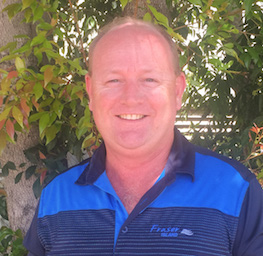
Colin Anderson is General Manager of Tours and Marine for the Kingfisher Bay Resort Group, a leading ecotourism property located on World Heritage listed Fraser Island in Queensland. Kingfisher Bay Resort has held Advanced Ecotourism accreditation for over twenty-two years and operates a resort as well as conducting 1, 2 & 3 day tours of Fraser Island. With more than twenty-five years’ experience in the eco-tourism industry, Colin has worked for the Kingfisher Bay Resort Group on Fraser Island for the past twenty years in various capacities including Tour Guide, Resort Manager and most recently as General Manager of Tours & Marine. He currently oversees a fleet of thirty-five buses, three Barges and a team of over a hundred. Colin holds a Bachelor of Environmental Science from the University of Queensland and has previously held positions with Queensland Parks and Wildlife Service and worked as an environmental interpreter/ tour guide in Queensland, Tasmania and the Northern Territory. Colin is a member of Ecotourism Australia and is involved in many local interests such as the Fraser Island Community Advisory Committee the Fraser Island Local Ambulance committee and the Fraser Island Association.

Michele’s background is in brand and communications. For 30 years, she and her husband Nick have operated a creative consultancy that specialises in brand strategy and design for organisations with a nature-based or tourism focus.
More recently they have been developing an authentic and immersive ‘Australian wildlife and conservation experience’ based around Yondah Beach House, their multi award-winning deluxe accommodation business located in South Australia. Set on 300 stunning oceanfront acres where dolphins, seals, whales and sea eagles are frequent visitors, this property is being restored to create new habitat for rare local species including the malleefowl, heath goanna and western pygmy possum, and a second deluxe beach house is currently under construction.
Michele was recently elected to the board of Ecotourism Australia and is a member of the SA Government’s Nature-based Tourism Task Force.
Marine parks, marine experiences
The South Australian Government has created a network of 19 marine parks to protect and conserve biological diversity and habitats, and provide opportunities for engagement and sustainable development. Marine parks differ slightly from land-based ones with broad zoning to manage activities and uses. South Australia has five marine park zones: restricted access, sanctuary, special purpose areas, habitat protection and general managed use. Of the 87,000 km2 within our network, 6% is contained in sanctuary/restricted access zones. Global targets for such zones are now set at 30% by 2030. While activities such as the removal of plants and animals are prohibited in sanctuary zones, many can occur throughout the network. One category is recreational and education with activities such as diving, snorkelling and tourism encouraged, noting a permit (or other authorisation) is required for marine tourism operators (MTOs) in sanctuary zones. There are many ways to enjoy life in our marine parks. South Australia’s Nature Like Nowhere Else nature-based tourism strategy promotes marine wildlife experiences without equal. Several MTOs are already engaged in offering breathtaking experiences, and the government recently invited expressions of interest for business opportunities within 18 national parks, gardens or heritage sites. South Australia is committed to facilitating nature-based tourism opportunities. Policies such as Great white shark tour licensing provide a framework for progressive tourism operations, and the Government is continuing work with MTOs to overcome key challenges around permitting, promotion and marketing. All up, now is the time to be active and immersed in marine parks.
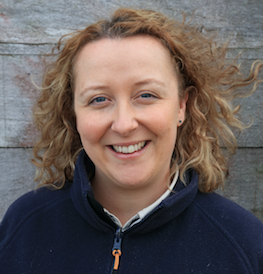
Alana Binns is co presenting with Melanie Stonnill
Alana commenced working at Seal Bay in 2012 as Site Manager. Having grown up in South Australia by the beach, she developed a passion for protecting the environment that led her to study Environmental Management at Adelaide University, whilst continuing a career in retail management roles.
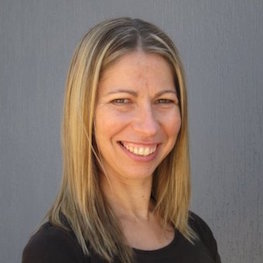
Marketing nature and culture to young adults
Research undertaken in 2014 revealed that young adults (18-34) were significantly underrepresented in visitation to NSW national parks. Research from around the world supports this trend and suggests a generational disconnect with nature. Urbanisation, consumerism and an increasingly digital and connected world support continuation of this trend. Renowned broadcaster and naturalist Sir David Attenborough once famously said: “no one will protect what they don’t care about, and no one will care about what they have never experienced.” Therein lies the challenge NSW National Parks and Wildlife Service (NPWS) set out to tackle with the Young Adults Campaign. The campaign is a fully integrated, multi-year marketing campaign that connects powerfully with young adults; shifting perception and behaviour to ensure nature and nature-based activities become highly valid, desirable and accessible options for the weekend – and beyond. Ultimately, the campaign aims to promote and encourage adoption of conservation values amongst young adults.
Julie Bishop has over 20 years’ marketing, communications and destination development experience in the visitor economy and related sectors in Australia, New Zealand and the United Arab Emirates. With a personal and professional passion for nature-based and cultural tourism, stints with three Australian state tourism organisations (Tourism Victoria (now Visit Victoria), Tourism Northern Territory and Destination NSW) and the opportunity to work on international stage as Marketing Director with the Abu Dhabi Tourism Authority, Julie brings extensive visitor economy experience to her ‘newish’ role as Director Visitor Experience with the NSW National Parks and Wildlife Service.
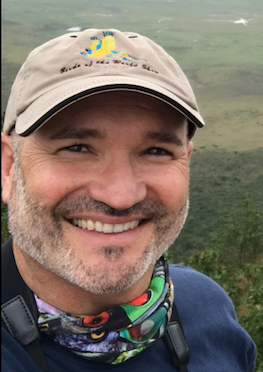
Storyvolution - Transforming as Nature Storytellers
Stories are always about evolution. After all, evolution is about survival through learning, changing, adapting and improving; so are stories. Language evolved so that we could exchange tales of trial and error, share success stories and build communities. Humanimals are the only species on earth to use words in spoken and written language. As a result, we enjoy both a great privilege and a big responsibility, as we can use the model of evolution to help us use our words well and be more effective storytellers.
When we share our passion in our work with nature, we are planting the seed or embryo of an idea, thought or feeling. When eyes and ears are already open with awe, intrigue or amazement, the climate and conditions are ‘just right’ for your message to evolve in the new territory of our audience. There are challenges to the survival of your story after it reaches the listener – will it be amongst the fittest survivors in the evolution of the human heart toward behaviour change? Will it not just survive but thrive?
Thankfully, the answer to that question is yes. The fitness of our stories is up to us. The genes of your story rely on your genius as an evolving story teller– to learn, transform, adapt and improve. At Zoos South Australia, our Storyvolution adventure continues to guide change and growth in community engagement with our purpose of connecting people with nature. Join me to find out how.
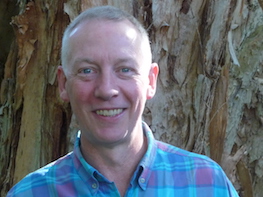
Rewarding Outstanding Tour Guides
Tour Guides and Protected Area Rangers add meaning and value to many of Australia’s greatest nature experiences. Their passion and professionalism are vital to Australia’s tourism offering. The EcoGuide program provides a framework to acknowledge these guides with a tourism industry based credential and rewards them with ongoing professional development opportunities.
EcoGuide is operated by Savannah Guides in Australia and provides certified guides with access to a wide range of benefits including online resources, network linkages, training workshops and field schools, accredited training, international guide training placements and employment opportunities. EcoGuide standards are linked to other nature based guiding certification systems providing a national standards framework. This system can be used to communicate natural and cultural values in the contexts of World Heritage and Geoparks to visitors and other stakeholders including media and the wider tourism industry.
This presentation will outline the framework of Australia’s nature based tour guide systems and showcase a range of case studies of EcoGuides in action.
Russell Boswell is Manager of Savannah Guides and a regional tourism development and marketing professional. He has delivered various regional ecotourism initiatives in Australia, The Pacific and China, worked with leading tour operators to create soft adventure and interpretive experiences, and run the Ecotourism Program at TNQ TAFE College. Russell is also the Manager of Savannah Way Limited, promoting the drive route from Cairns to Broome, and has a particular interest in Indigenous tourism.
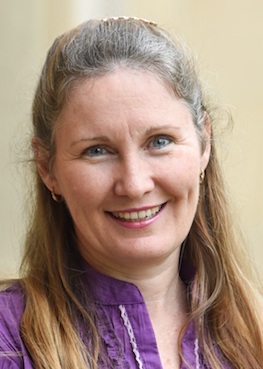
Mainstream Eco Tourism: are we pushing the right buttons? Insights from Environmental Ethics
Many of you will be familiar with a founding Father of the environmental movement, Aldo Leopold (1887-1948). Even in his day, Leopold recognised the negative impacts of recreationalists on the natural world. Yet he also understood the importance of ensuring that people experienced nature, as this was the only way they would recognise the vital importance of protecting it. This presentation offers an original account of the ethics of Leopold, as it unfolds in his classic work, A Sand County Almanac. We argue prior interpretations failed to incorporate Leopold’s lynchpin “cultural harvest” idea into his larger “land ethic”, and that a proper understanding of the cultural harvest reveals how tourism and other recreational activities can drive a person’s ethical development. Ultimately, the land ethic helps us protect and nurture the most precious sustainability resource: human beings that value and respect the environment. While Leopold’s focus was not on tourism, he spoke of the need to open up five key areas of the “cultural harvest”: storytelling, learning/knowledge, beauty/aesthetic appreciation, rarity/the hunt for trophy, and signature/personality. These are all aspects of ecotourism experiences. So the question is whether we currently develop and deliver experiences that engage in the ways that matter most to the visitors, are likely to encourage pro-environmental behaviour, and can assist in their moral development. Can we make small changes that optimise the benefits of tourism, whether it be in protected areas, interactions with wildlife, or in mainstream tourism, that better harness the powerful force of ecotourism for conservation?
Dr. Noreen Breakey holds a PhD in tourism destination development and is a lecturer and researcher in Tourism at the UQ Business School, The University of Queensland, Australia. Her research explores the relationships between people, tourism and the natural environment, through her principal research areas of environmental ethics, sustainable tourism, ecotourism, community-based tourism, and tourism in protected areas. Prior to her academic career, Noreen worked for over a decade in industry, including hotels, resorts, tour operations, travel agencies, and events in Australia and overseas, as well as in government, as the Corporate Planning Analyst at Tourism Events Queensland.
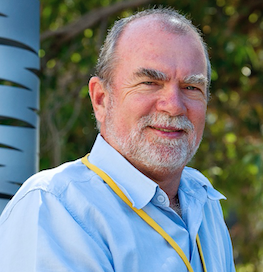
Driving rural recovery with Geotourism in the Wheatbelt of Western Australia
Geotourism is a niche market growing strongly on a global basis. Australia has a strong Nature-based tourism industry and visiting tourists are attracted by the earthy nature of this vast continent with places nationally such as Uluru, Great Barrier Reef; and in Western Australia, iconic attractions such as Purnululu National Park, Ningaloo Reef, Shark Bay and the Pinnacles high on their visitation lists. Lesser known regions such as the Wheatbelt of Western Australia with its isolated granite monadnocks situated on the Yilgarn Cration, one of the world’s oldest land platforms hold special geotourism values. A recent study of the area and its potential for geotourism has been completed. This paper will report on the outcomes of a case study based on Wheatbelt stakeholder perceptions of geotourism, geoparks and the sharing local geotourism product with tourists; and the potential for transforming communities from diminishing to flourishing communities based on geotourism development.
After 40 years in Western Australian government in forest and land conservation and management; recreation and tourism, Ministerial office for Forests and the National Trust, Alan retired from the government way of life. After achieving his MBA, Alan lecture in tourism at Edith Cowan University from 1997, becoming an Adjunct Lecture in 2009.
Alan established Natural Heritage and Culture (NHC) taking on consultancy tasks. A long term committee member of Forum Advocating Cultural and Eco-Tourism (FACET) he has strong interests in Eco-tourism, Geo-tourism and Geoparks and Indigenous engagement in land management, tourism and geoparks.
In 2011 Alan lectured full time in tourism on campus at Murdoch and subsequently, until mid-2016, lectured part time in Sustainable Tourism. Alan commenced a PhD in March 2012 at Murdoch University and is now a full time student. The PhD research focuses on stakeholder perceptions of establishing a Geopark in the Wheatbelt of Western Australia.
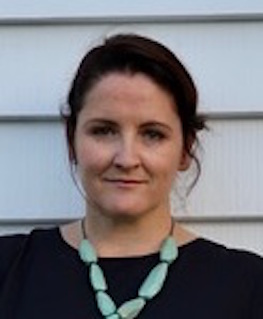
Transforming Urban and Regional Tourism through Cultural Heritage Experience Development
This paper presents a framework to help urban and regional destinations transform from a passive role as ‘conservers’ of cultural heritage, to a more active role that truly engages the heritage visitor. We know that visitor needs are changing and that today’s visitors are looking for memorable experiences and journeys that emotionally connect them to a destination. By finding ways to create such experiences, destinations benefit not only economically through greater visitor numbers and spend, but also through enhanced opportunities to foster a deeper environmental and cultural understanding, and a richer appreciation for conservation efforts.
This paper demonstrates how a destination can achieve this transition through a consistent framework. It involves rigorous consultation with heritage tourism stakeholders (from national to local level) to develop a shared vision and guide regional stakeholders to develop their own themes and stories, regional experiences, signature experiences and supporting products. The innovative aspect in our approach is the emotional connection that is formed through storytelling, as ultimately it is the human element that truly immerses and engages a visitor.
The framework was developed and tested by EarthCheck and Customer Frame in a project for the Australian Council of National Trusts. Our partnership brings together world leaders in sustainable tourism accreditation and consulting, with globally-acclaimed customer strategy, experience innovation and transformation consulting expertise. The outcome of this work to date has been a tangible blueprint for Experience Development across the National Trusts network, with the framework now being applied in other projects (e.g. the Barossa Valley).
A dynamic marketing and customer strategy professional, Sueanne has delivered step-change success for major global brands throughout the UK, Europe and Australia.
With industry depth across the tourism, hospitality, business services and consulting sectors, her applied experience has proved invaluable to clients. Her impressive reach has touched market-leading brands such as lastminute.com, Travelocity, Hays Recruitment, Tourism Queensland and Tourism Australia, bringing not only a global perspective, but a tangible digital flavour, to her experience.
With a passion for working with people, Sueanne loves nothing more than getting her teeth into business challenges, formulating plans and empowering others to make change happen.
A POWERFUL PARTNERSHIP: EARTHCHECK + CUSTOMER FRAME
The EarthCheck and Customer Frame partnership brings together the world leaders in tourism and sustainability accreditation consulting with globally-acclaimed customer strategy, experience innovation and transformation consulting. Working within a common agenda of transforming the tourism industry through sustainable, customer-centred change, EarthCheck and Customer Frame are committed to collaborating with industry stakeholders at all levels.
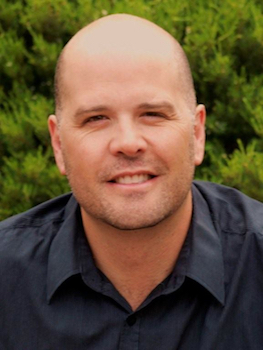
Carl Charter is co-presenting with Jessica Wilson
Carl Charter is a well-known Adelaide photographer and marine enthusiast. His photos, both above and below water, are highly regarded around the world. Carl is self-employed and works for Conservation Council SA (Reef Watch) and as Executive Officer for Experiencing Marine Sanctuaries, which he co-founded in 2015.
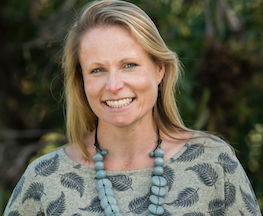
Putting the Potoroo Back in the Picture - ecotourism for conservation and community
From all around the world, people come to the Great Ocean Road to see the stunning landscapes and the exquisite wildlife. However, in Australia’s most highly visited nature based destination, visitors currently spend little time or money. This situation affects both the economy and the visitor experience as well as impacting on natural assets.
The Conservation Ecology Centre, a non-profit conservation organisation, is taking an innovative, business based approach to address this issue through the development of a new ecotourism social enterprise, ‘Wildlife Wonders’. Built on a commitment to the local community, the ecosystems and the wildlife of the region, as well as the visitors who come to share the Great Ocean Road, ‘Wildlife Wonders’ has been embraced at all levels.
The ecotourism experience is being designed by the Art Director of ‘The Hobbit’, Greens Master of ‘The Lord of the Rings’ and designer of the highly successful NZ tourism attraction, Hobbiton. In its creation and operation ‘Wildlife Wonders’ represents an inspiring approach to economic development and conservation.
Lizzie Corke is CEO of the Conservation Ecology Centre, an organisation working to develop and deliver solutions to the most urgent conservation challenges in Victoria’s Great Ocean Road. Ecotourism plays a critical role in the organisations funding and engagement programs - the Centre established the Great Ocean Ecolodge in 2004 (Winner Victorian Tourism Awards for best new development, recognised by National Geographic Traveller as one of the 25 best ecolodges in the world) and is currently developing a new ecotourism venture which provides outstanding opportunities for conservation and economic development of the region. Lizzie is the recipient of the 2005 Prime Ministers Award for Environmentalist of the Year.
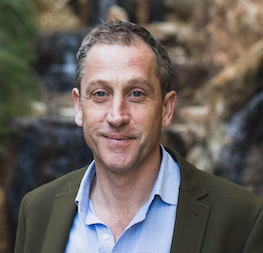
Bathe the World - Creating global connections through natural hot springs
The inaugural Bathe the World event aims to bring together representatives of every nation on earth to bathe at Dalhousie springs, home to the lower Southern Arentre people and close to the geographical center of Australia in June 22-25, 2020. The event aims to create international understanding and awareness of geothermal destinations worldwide, and their connection to country, culture, and community. For centuries hot springs have been embraced as ecotourism, leisure, health and wellbeing attractions. Hot springs represent one of the largest segments of the combined domestic and international tourism markets in countries including Japan, China, New Zealand, Hungary and the Czech Republic. South Australia’s Dalhousie Hot Springs, in the middle of the Australian continent is the selected location to stage Bathe the World™, being the world’s largest natural thermal springs by flow rate at 17,000 litres per second. Thermal waters have been flowing in this location for over a million years.
This presentation aims to launch and bring awareness to the Bathe the World™ event to the global ecotourism industry. The initial 2020 event aims to further the connection to self, environment and culture through the natural warmth of hot springs.
Charles Davidson is CEO, founder and director of Peninsula Hot Springs (AUS), Director of Maruia Hot Springs (NZ), Chairman of the Victorian Tourism Industry Council and foundation member of the Global Thermal Think Tank (G3T). Peninsula Hot Springs is an Ecotourism Australia member and eight times winner of the Victorian Tourism awards and three time winner of the World Luxury Spa Awards category of Global Best Mineral Spring Spa. PHS attracts over 450,000 people each year and employs 280 people on Victoria’s Mornington Peninsula, Australia.
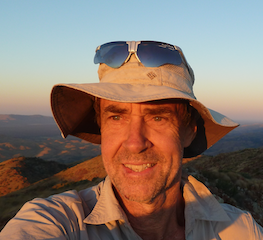
Chris Day is co-presenting with Stuart Ord
Chris began his career with the Parks and Wildlife Commission in 1981 as a T1 Ranger. Since then, Chris has worked at a number of parks throughout the Central Australian region, including Alice Springs Telegraph Station Historical Reserve, Finke Gorge National Park, Watarrka National Park before becoming the Senior District Ranger and Chief District Ranger for Central, East and Barkly Parks and West District Parks. In addition to his extensive experience in protected areas management, Chris also has considerable expertise in joint management, training and development of staff, visitor management, interpretation, and community engagement. Chris thrives in the diversity of work provided by the Commission and believes that he has the best office in the world. Chris has been the Director of Central Australian Parks since 2012.
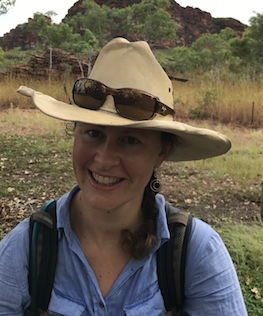
Karri-djarrkdurrkmirri (Working Together) Best Practice supporting Indigenous tourism in protected areas
As the previous Tourism & Visitor Services Manager for Kakadu, in 2016 Tracey Diddams undertook a review of the topic Indigenous tourism broadly and will present an investigation into best practice supporting Indigenous tourism in protected areas. Working together with the Bininj/Mungguy Traditional Owners, Tracey was motivated to understand how to best implement the Park’s tourism vision and policies while supporting the aspirations of Bininj/Mungguy people. A qualitative content analysis of publicly available documents authored by protected area managers in Australia, New Zealand and Canada were reviewed identifying emerging themes such as the diverse definitions of Indigenous tourism, levels of involvement from Indigenous people in tourism planning and the planning approaches used, barriers, opportunities and methods of implementation (action plans/strategies). Recommendations from this research have been shared with the Kakadu Board of Management and Parks Australia staff for future tourism planning and Tracey is keen to share these findings with other protected area managers, Indigenous peoples and the broader tourism industry.
Tracey Diddams has been involved in the tourism industry in various parts of regional Australia for the past 18 years. Tracey has worked both within the tourism private sector as a Regional Business Manager as well as the Tourism and Visitor Services Manager for the Commonwealth and Jointly Managed Kakadu National Park. Tracey left her role in Kakadu in early 2017 following her park ranger husband to Keep River National Park in the NT, located on the door-step of the Kimberley. She has commenced her own writing consultancy Trace Writing assisting government, Indigenous businesses and protected areas with writing needs.
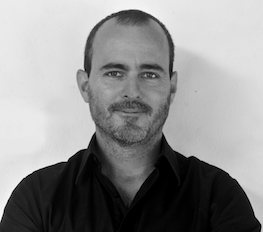
A New Tourism Offering for Seychelles
In a country where Tourism is the most important non-government sector of the economy, amongst a competitive global tourism market, VIDA has been appointed the lead consultant for the visioning and planning of a low impact eco-tourism project in Seychelles.
The Indian Ocean island nation is renowned for its world class beaches, yet the proposed Grand Bois Community doesn’t seek to compete with the extensive number of ocean focused hotels and resorts. The proposed mountainside eco-community and lodging will instead broaden the tourism offering by developing a nature based experience that will hopefully transform the perceptions of this small island nation.
But the site is large and complicated and many areas inaccessible due to the steep terrain and large granite boulders. The project is of national interest as it hosts extensive areas of endemic threatened species and contributes to the water supply of the largest communities on Mahe, the main island of Seychelles.
Invited to the project after several reputable companies had failed, VIDA cautiously began working on the project guiding the team through our planning methodology which is driven by first gaining a deep understanding of site and context. VIDA has worked with the team to establish realistic expectations, local flora and fauna and environmental permitting specialists to understand the intricacies of the site and context. Through several revisions VIDA has developed a master plan for a low impact residential and eco-tourism project that will potentially play a regenerative role in the local environment, community and economy.
Experience has taught Matthew that nothing produces results like the bringing together of great individuals, in-depth analysis, good listening, outstanding design and hard work. Matthew draws on 17 years of experience spanning four continents and a dozen countries. His work focuses on creating sustainable land-use solutions that balance creativity, sustainability and profitability for international resorts, nature-based communities, hotels, rural estates, private residences and ecolodges.. These are lofty ideals for a boy from rural Australia - no argument. But, luckily, Matthew has the skills to back it up. He has extensive experience in the design, management and implementation of international projects and the proven ability to deliver world-class results - often in isolated regions on challenging sites. Prior to co-founding VIDA, Matthew was partner at 40NORTH and Managing Director of their expansion into Central America, following five years with EDSA in Beijing, China and Fort Lauderdale, USA.
Release of South Australia’s Nature- Based Tourism: New Business Opportunities package
In 2016, the South Australian Tourism Commission and the Department of Environment, Water and Natural Resources (DEWNR) developed a new nature-based tourism strategy and action plan for South Australia called Nature like Nowhere Else. One of the key priorities in the action plan is to activate private sector investment in parks through the release of a nature-based tourism investment attraction package. This package was released to the public on 12 October 2017. This package invites expressions of interest in 18 sites across South Australia’s parks, heritage sites and botanic gardens. These sites provide scope for the private sector to develop new tourism experiences such as tours, eco sensitive accommodation, cafes, cellar doors or event venues. Investment at these sites will help to achieve our goals to create 1,000 new jobs and to inject an extra $350 million into our State economy every year. The release of this package will also position the South Australian Government as a leader this space, focus investor attention onto South Australia and consolidate the Department’s reputation as a facilitator of business development opportunities.
Science supporting tourism – An adaptive management framework for Great white shark tours
Diving with great white sharks is a significant tourism drawcard for South Australia. It already contributes approximately $10 million to the state economy and supports over 70 jobs. The establishment of an adaptive management framework will enable the sector to grow further, while also make sure that sharks are protected. Operations are now closely aligned with scientific monitoring and a growing appreciation of great white shark ecology. A new policy sets scientific triggers for the relaxation or strengthening of controls on shark cage diving activities. While this approach is not unique in the sustainable development of natural resources such as fisheries, this approach has significant potential for the sustainable development of eco-tourism ventures. The project has established a new benchmark of excellence in the sustainable development of shark tourism and nature-based tourism more broadly.
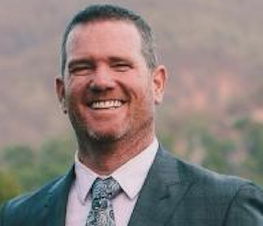
Are Ecotourism businesses the social change leaders fora better world?
Ecotourism, by definition, travels lightly, has a low footprint and sits comfortably within the natural and social surrounds of its local environment. But in a world of increasing chaos with climate change, and the early indicators of a 6th Mass Extinction, is that enough? Is it time for Ecotourism operators to step up and contribute, and what does that look like? Innes Larkin will outline how Mt Barney Lodge is utilising quadruple bottom line practices to create social change one issue at a time. Firstly within their local region where Mt Barney Lodge was the driving force behind a campaign stop coal and CSG in 2010-2012 within the Scenic Rim. A campaign which resulted in both Innes and Tracey getting arrested for their beliefs yet has resulted in the Scenic Rim Region being now devoid of all coal exploration licences and the CSG companies ceasing all exploration. And secondly with Mt Barney Lodge now joining the campaign to Stop Adani, a proposal which they believe risks harming our planet and industry too much for an ecotourism business not to get involved. What are the social change issues you believe in and how can your business create the world you want to live in?
Innes Larkin has been active in the outdoors from an early age and remembers climbing Mt Barney for the first time at age 11. Innes has bushwalked and climbed in Australasia, Europe, UK, and Nepal including expeditions to Mera Peak and Ama Dablam. In 2016 Innes was jointly awarded the Australian Search and Rescue award for his services in helping rescue 700 people.
A teacher with a Masters in Outdoor Education, Innes has taught in London, and QLD. In 2006 Innes and Tracey Larkin purchased Mt Barney Lodge and have grown the business 900% since then. Mt Barney Lodge has been ecotourism accredited since 1996 and now holds Advanced Ecotourism Accreditation.
A current member of the advisory committee for the Gondwanan Rainforests of Australia World Heritage property, and a board member of Ecotourism Australia, Innes is passionate about sustainable tourism and the lasting legacies it can bring to a region.
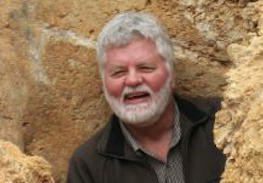
Geoheritage, Geotourism, Geotrails and a South Australian Songline
Author: Ian D. Lewis, Scientific Assessment Officer, Science Coordination Team, Department of Environment, Water and Natural Resources Co-author: Angus M. Robinson, Founding Member, Geotourism Forum, Ecotourism Australia
Worldwide trends in Nature Tourism have greatly enhanced a desire by the public to visit natural sites and value them through World Heritage areas, UNESO Geoparks, National Parks and Ecoparks etc. While these are readily accessible in closely-populated lands such as Europe, the United States and China, those of large area with more sparsely-distributed populations - Canada, South America, Africa and Australia - have the challenge of distance between important natural sites for the visitor.
One emerging trend is using the linking theme of Geotrails. For example, a series of many local and province-scale Geotrails link up across Canada to cover the full width of the North American continent.
‘Geotrails’ can be short. However, across large distances of the Australian continent where extended travelling is required, Geotrails can relate landscape themes such as geology, marine environments, local history, culture and wildlife into a multi-faceted framework. Geo means world, not just rocks! One outstanding South Australian example could incorporate the attractions of the Heysen and Bonython Trails extending 1,000 kilometres from Kangaroo Island to Arkaroola and Witchelina, utilising linking themes of a range-length ‘Songline’ and the important association with Sir Douglas Mawson and his Australian-Antarctic geological discoveries.
Rather than promoting them only as trails for walkers and hikers, these great trails can be greatly enhanced by emphasising driver access to multiple points along the trails, utilising apps and promoting packaged flights to and over these marvellous locations in a travel style which will appeal to them and be very marketable.
Ian works as a hydrogeologist in DEWNR’s Science Group. He is also involved in Natural Heritage, Geopark and Geotrail projects in South Australia and Victoria and is completing his PhD on the Geology of the World Heritage Naracoorte Fossil Caves. Ian is Honorary Director of ‘Kanawinka Volcanic GeoTrails’ which links visitation of the volcanoes across the Mount Gambier and Western Victorian rural regions. This has become a template for developing a broader concept of ‘Geotrails’ to link separate special features of the landscape across larger distances of the Australian continent. This linking strategy is intended for the benefit and promotion of tourism across rural regions of Australia and as an important contribution to the emerging ‘Nature Tourism’ initiative.
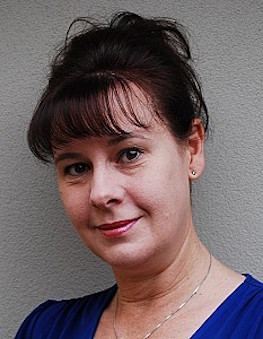
Renata Lowe is Tourism Western Australia’s Director Destination Development managing the team delivering a range of projects aimed at enhancing and building the State’s inventory of extraordinary tourism experiences. Current projects relate to Aboriginal tourism, caravan and camping development, cruise tourism, visitor servicing and a suite of regional tourism projects. Renata is a past CEO of the Australia’s Golden Outback regional tourism organisation and the Western Australian Indigenous Tourism Operators Council, and was a Tourism Policy Advisor for former State Tourism Ministers.
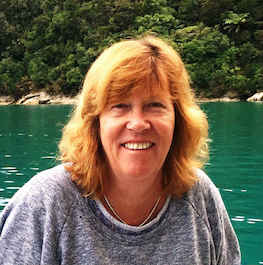
Niue's approach to Development through Sustainable Tourism
Niue can be described many ways. The world’s largest coral atoll. A micro-nation. Island nation with traditional village law and life. Home to just 1400 permanent residents, Niue offers a unique visitor experience. Heavily marine-focused, with the opportunity for visitors to immerse themselves in the clearest deep blue water, swim with humpback whales in Niue’s Whale Sanctuary, explore endless coastal caverns and limestone caves, go fishing with locals and experience traditional village life on one of the most remote places on earth. Niue is a living example of how Sustainable Development can be supported by tourism, if the appropriate support and development processes are in place.
Niueans recognise that their pristine waters, unique geography and remote location are highly appealing to the adventurous traveller. Niue is actively seeking to develop as a sustainable tourism destination, with a program of projects that are designed to increase visitor satisfaction, while ensuring environmental protection, reef resilience and overall sustainability of the tourism industry. This presentation will give an overview of the work undertaken to date in Niue and a look at what’s to come. Experience and innovative product development, partnerships within the tourism industry and community, a Responsible Tourism Policy, Minimum Operating Standards and Certification Program are being rolled out. We are establishing a conservation partnerships to assist with protecting the environment, engaging the local community and visitors of Niue. These initiatives will be in place to support Niue as a premier Marine Ecotourism destination by the time the Marine Protected Area is launched.
Janet has an extensive background in recreation and tourism planning, destination management, community consultation, policy development and organisational review. Her expertise also includes strategic planning, product development and business planning for nature based, indigenous and heritage tourism. Janet works closely with indigenous communities on business development and mentoring projects. She has worked in most destinations in Australia, New Zealand and internationally.
Neil Mackenzie is co-presenting with Chris Thomas
Coming Soon
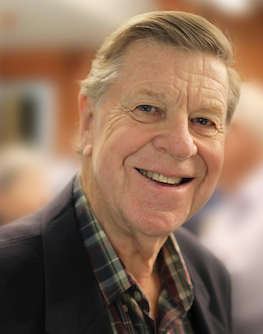
Duncan is currently the Chairman of BirdLife Australia Gluepot Reserve (20 years) and is a Life Member of BirdLife Australia. He is on the board of BirdLife Australia and is the President of SA Friends of Parks Inc. Duncan is a member of the South Australian “Parks and Wilderness Council”, which was formed by the Government to advise the Minister for Environment on matters pertaining to the environment and conservation in parks and wilderness areas. Duncan is a member of the Volunteering SA/NT Strategy Working Group and is the immediate past Chairman of Ecotourism Australia (8 years) and the South Australian Tourism Industry Council (8 years). He is Chief Scientist on the Management Committee of the Scientific Expedition group (SEG) and is a past Australia District Governor and International Chairman of Kiwanis International.
During his 40 years with Kiwanis, he managed an international health project to eliminate Iodine Deficiency Disorders (IDD) from the world by the year 2000. This was undertaken in partnership with UNICEF and he spent the best part of five years overseas, helping Kiwanis raise over US$120 million, writing IDD manuals and papers, lecturing/training, undertaking discussions with the health ministers of countries affected by IDD and in the general international promotion of the IDD project.
Duncan was a biological research scientist with the Australian National Antarctic Research Expeditions (ANARE) and spent a number of years in Antarctica leading research into royal penguins, elephant seals, fur seals and albatrosses. He was then seconded by the Australian Government to Adelaide where he helped set-up and manage the biology Division of the Mawson Institute for Antarctic Research at the University of Adelaide.
His background is in the management of large information technology companies and he has held senior management and board positions with the Ford Motor Company, Alcoa of Australia, Tubemakers of Australia, Data Conversion Corporation, Bell&Howell Australia and New Zealand and Nature Foundation SA. In his early years as a senior systems analyst, he developed new systems for major Australian corporations and Australian and overseas governments.
Duncan’s main skills have been in the development, organization and management of large commercial and community organizations and scientific research projects, both in Australia and overseas. His expertise covers the areas of fundraising, marketing and communications, business and finance, organizational development and system analysis. In the legal area, Duncan was the BirdLife Australia Gluepot Reserve representative (for 10 years) in the matter of the First Peoples of the Murray and Mallee Region Native Title Claim that covered all of Gluepot. In 2011, the Claimants withdrew their claim over Gluepot and entered into a binding agreement with the State that they will lodge no further claims over the Reserve.
His hobbies are nature photography (particularly birds) and he is an international accredited photographic judge. He is the author of over 400 papers, articles, books etc. in the fields of information technology, IDD, conservation, environment, ecotourism and photography.
Strong People Strong Country - Co-management of Parks in South Australia
The South Australian Government has adopted a unique approach that brings together Aboriginal aspirations and conservation goals in order to achieve the best outcome for parks and communities.
At its core, co-management recognises Aboriginal people as the original custodians of our land, and acknowledges the importance of the customs and knowledge that have been passed down through generations of Aboriginal South Australians. Importantly, co-management of parks offers tangible steps towards reconciliation, strengthened mutual respect and understanding, while building the economic and social capacity of communities.
There are now 12 co-management agreements in place over 35 of South Australia’s parks and reserves, covering 13.5 million hectares or 64% of the State’s reserve system.
During this session, Adrian Marshall and an Aboriginal guest speaker will discuss how co-management of parks enables Aboriginal communities to re-connect with their traditional lands and have an active role in planning and decision making with regard to national parks under the National Parks and Wildlife Act 1972.
The involvement of Aboriginal people in the management of their traditional lands contributes to improved cultural site protection, maintenance of traditional practices that may have otherwise been excluded, and improved management of parks through the combination of traditional knowledge and contemporary science. This results in numerous flow on effects for the broader community and overall contributes to the visitor experience.
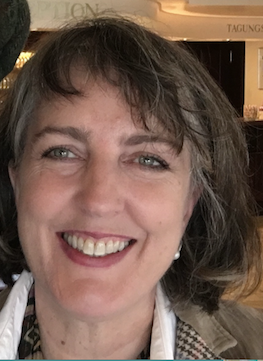
Bespoke Superpod tourism with low power demands spells "Eco"
For a true luxury experience in travel accommodation, nothing beats the indoor climate of a certified Passivhaus building to eat, relax and sleep in. No matter whether the climate outside is hot and humid or icy cold, the Passivhaus building will protect occupants like a cocoon. Find out how we have designed our Passive house tourist accommodation, and how you can have passive house benefits in your next accommodation project.
No longer will your customers complain about stifling heating or dry airconditioning. No longer will you face the high power bills that come with poorly designed buildings.
Staying in a passivhaus is truly an experience that won’t be forgotten. And maybe a learning experience that your customers can take home with them to influence change in our high carbon world.
This is the ethos behind PodTime, whose first Superpod project is planned for Tasmania next to MONA (last year’s Eco-Tourism Conference venue).
Is it possible for others who develop their own tourist projects around the world to give their clients the optimum in comfort, while saving the planet too? (Not to mention the radically low power bills for the facility.)
It is possible, if developers decide that this is what they want for their customers.
And going this way is a true “Eco-tourist” experience, for operators, for clients, and for the environment.
Hear how we have designed our Red Rosa project, from our high quality insulation materials in the walls, to our German Design Award Nominated minimalist “Pende” table. I will share our story. Will you join us to make Superpod part of your next tourist accommodation story?
Designer of Passive House Buildings, consultant to builders, achievement of Certified Passive House, developer of Hobart tourism project, Good Design Award recipient for Superpod.
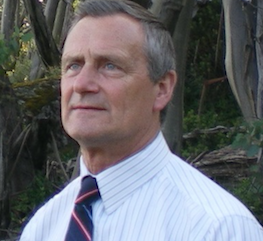
The Larapinta Trail: delivering significant regional tourism benefits through planning, partnerships and strategic investment
The Larapinta Trail is an iconic 230km long multi day arid zone hike traversing the length of the 2528km2 Tjoritja West MacDonnell National Park in the Northern Territory. Since its completion in 2002 the trail has grown significantly in stature and importance to the regional economy of Alice Springs. This has been achieved through excellence in planning, partnerships and continued strategic investment by the Northern Territory Government and commercial tourism partners.
Tjoritja West MacDonnell National Park contains many of Central Australia’s iconic tourism attractions including Simpsons Gap, Standley Chasm, Ellery Creek Bighole, Ormiston Gorge and Pound, Redbank Gorge and Mt Sonder. The Larapinta Trail takes hikers through a stunning cross section of the Central Australian landscape, one which was made famous by the water colours of Aboriginal artist Albert Namatjira.
The park is a jointly managed National Park and operates under the auspices of a Joint Management Committee. The land is owned by its traditional owners as freehold land under the Commonwealth Aboriginal Land Rights Act (NT) Under the Indigenous Land Use agreement for the park, traditional owners benefit from all income generated from the park.
The Parks and Wildlife Commission, managers of the park and Larapinta Trail, works in close partnership with Tourism NT to ensure commercial tour operators and independent walkers are rewarded with the best possible walking experience. Together they manage and promote the trail and provide vital support services through strategic government investment programmes.
Stuart’s current role is Director of Product Development Central Australia with Tourism NT, one of a team responsible for the strategic alliances within the tourism industry in the Northern Territory. Prior to that he was General Manager of Tourism Central Australia, a Not for Profit organisation based in Alice Springs.
Stuart has previously been the CEO of the Mt Baw Baw Alpine Resort in Victoria for three years, where he took on the task of revamping the existing business model to develop the resort into a more financially sustainable entity than existed.
Stuart’s other work experience was with Parks Victoria where he was a Regional Director for many years and finally headed up the inaugural Healthy Parks Healthy People Directorate for Victoria.
Stuart is a Graduate of the Australian Institute of Company Directors, the past Chair of the Australian Tourism Awards judging panel, and a former committee member of the Australian Alps Landscapes Committee.
A pathway to Stewardship – stepping into a sustainable future
Advances in regional stewardship and recreational fishing in the ‘multiple use ’Great Barrier Reef Marine Park Stepping into a sustainable future It’s a story along the Great Barrier Reef coast that involves politics, angst, division, bad blood and considerable challenge in the in the cauldron of resource sharing. It is about an outcome that bodes well for the future — it is about recreational fishers and the coastal tourism supporting it taking on demonstrable responsibility to look after what they value. It is doing it without waiting for the slow wheels of Government to catch up. Three significant net free areas were created in Queensland in 2015 amid resource sharing furore among commercial and recreational fishers; some of it warranted some of it not. It had been a festering sore and good people, with good ideas and a willingness to offer solutions were burned along the way. Irrespective, the Queensland Government created the three areas as a contribution to the Reef 2050 Long Term Sustainability Plan and to coastal tourism development. The fishers were challenged “O.K. you’ve won the areas…now prove you can look after them into the future and prove that they work!” They took the challenge on; with driving input from Regional Councils, particularly Rockhampton, and from remarkable people, Bill and Stefan Sawynok ‘Info Fish’ who created accessible monitoring platforms that work in real time. The partnerships developed are fostering demonstrable stewardship, ‘care for the fish, enhance their habitats’, it is creating responsible tourism opportunity and a regional identity.
Randall has been actively working in Marine Protected Area management for over 30 years. Firstly at the Houtman Abrolhos Islands in Western Australia and for the past 17 years with the Great Barrier Reef Marine Park Authority. He works at the fisheries/environment/tourism interface with a particular interest in advancing marine resource stewardship among coastal communities. The socioeconomic value of coastal fishing related tourism is not well recognised nor is the link between advancing resource stewardship and care of ecologically connected coastal and inshore systems. Recreational fishers are a substantial, if loosely organised, stakeholder group of importance in marine resource management. By advancing stewardship principles with them we foster the care of coastal habitats and ecosystems that they rely on for their enjoyment and recreation; it can also foster a sense of regional identity and that is a powerful catalyst to advance responsible coastal tourism.
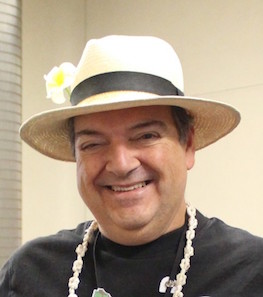
Of Mantas and People in Yap: Challenges and Opportunities for Ecotourism in Micronesia
Yap, in the Federated States of Micronesia, has become one of the world’s most coveted dive destinations for watching manta rays, a place where traditional culture still plays a key role and adds to the attractiveness of the destination. Although small-scale in numbers, manta diving is key to Yap´s economy, including fees paid directly to villages which retain tenure over lagoon areas. Both a Manta Ray Sanctuary and a Shark Sanctuary were enacted into law, which could provide further support for both sound management and promotion of Yap´s diving. This presentation reflects upon the opportunities created, challenges faced, including the impending threat of large-scale development to cater for Chinese tourism - and future prospects of the diving activity, which is vital to help steer the local economy in a sustainable direction.
Jose Truda Palazzo, Jr. is an environmental consultant and writer with 14 books published and 39 years of international experience focused on international conservation treaties, marine protected areas and non-extractive uses of marine biodiversity, including non-lethal research and Marine Ecotourism. He has repeatedly served in government delegations of his homeland Brazil to a variety of diplomatic fora, and authored technical documents for organizations such as the International Whaling Commission and the Convention on Migratory Species. He currently serves as Manta Ray Bay/Yap Divers Environment Ambassador; as Member of the IUCN Tourism and Protected Areas Specialist Group, World Commission on Protected Areas and Joint WCPA/Species Survival Commission Task Force on Marine Mammals and Protected Areas; as Coordinator for Divers for Sharks; and as Vice-President of the Augusto Carneiro Institute.
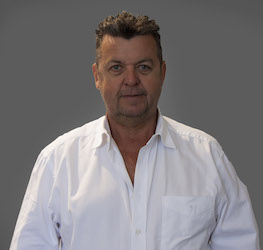
Building for the future
Long before the ‘glamping’ concept became a global trend, Eco Structures Australia Director, Karl Plunkett was already a veteran of the concept. Today, he continues to meet the demand of local and international suppliers and tourism operators who are choosing his Eco Tent products above all others for their smart, sustainable design considerations and cost efficiencies. His passion for eco-building solutions has evolved into developing add-ons like bathroom pods, and the innovative WABI building series - adaptable interlocking modular rooms made with a patented PIR fibre cement wall panel system that carries a R3.3 rating, and supported by structural building foundations. The business is represented in all Australian states, as well as New Zealand and USA. Karl is here today with Eco Structures Eastern States Sales Manager, Hamilton Heading, and will be presenting an overview of Eco Structures, and the work he does.
Karl Plunkett is best described as the trailblazer of sustainable, eco-tourism experiences and a developer of alternative building solutions - not only in Australia, but on an international scale. At just 21, his entrepreneurial foresight saw him build and own Broome’s first of three back-packer hostels in 1988, which led to building and operating the multi-award-winning Eco Beach Wilderness Retreat (EBWR) in 1996.
When a devastating category-5 cyclone destroyed EBWR in 2000, Karl saw a positive opportunity to diversify the eco-experience, by creating a next-level, resort-style luxury retreat with an elevated emphasis on the core principles of sustainable and cultural tourism. Renamed Eco Beach Broome, the award-winning property was again re-badged in 2015 when it joined forces with the Wyndham Hotel Group and is now operating as Ramada Eco Beach Resort.
Following the redevelopment of Eco Beach Broome, Karl’s vision of ‘building for the future’ was realised through the founding of Eco Structures Australia, whose alternative building solutions are breaking ground, both locally and abroad, in the manufacturing of pre-fabricated modular eco-tents, cabins and villas, and most recently, the WABI – a versatile, cost-effective system of interlocking modular rooms that adapt to a range of accommodation options. Karl consistently invests in research and development of the advanced manufacturing of prefabricated and tensile structures and continues to produce innovative building solutions to suit today’s thirst for authentic eco-experiences. This year has seen him build in five, Class A reserves in five different countries.
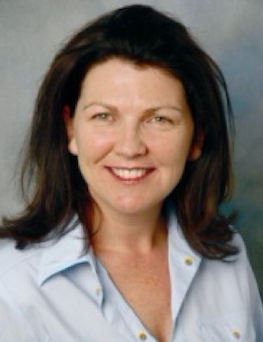
Think Global, Act Local – applying megatrends in tourism to your destination or business
In a dynamic and highly competitive marketplace, destinations and tourism businesses need to keep abreast of global trends and apply them locally to maintain their competitive advantage into the future. A customer or visitor-focused approach to destination planning, management and marketing is essential. At the heart of this approach is understanding your visitors, their motivations, expectations and barriers to travel. If you know what to expect of the future, this challenge becomes more manageable. It will inform the development of new experiences or the way you refresh existing ones as well as the way you reach out to potential visitors to promote your destination. The International Year of Sustainable Tourism for Development is a great time to ensure that destination planning, experience development and marketing adopt a visitor-centric approach and better understand how the megatrends can influence what you do on the ground. Drawing on case studies from across the Asia-Pacific and around Australia, the presentation aims to provide the keys to success for applying recent or emerging global trends locally and helping to lift the performance of your destination or business into the future.
Charlotte Prouse, Partner, Destination Marketing Store Charlotte has been working with tourism regions, organisations and destinations to create and implement great destination brands, strategic marketing plans and experience development strategies for the last 20 years. Charlotte has worked extensively on brand and marketing strategies for regions and destinations, including undertaking the positioning of 12 of Australia’s National Landscapes (NL) and as part of the team to develop a number of NL Experience Development Strategies. Charlotte has also developed marketing strategies for some major destinations and organisations, including the NSW National Parks & Wildlife Service. Charlotte has mentored many small to medium sized tourism operators to build industry capacity and provide strategic marketing and product development advice. Charlotte has led the development of new visitor experiences, such as Zoo2Q in Sydney Harbour National Landscape.
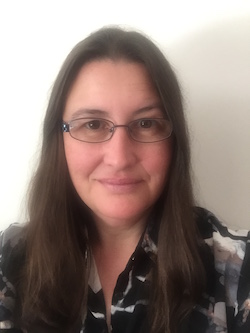
Time travelling in South Australia: developing opportunities for regional fossil tourism and education.
South Australia has a fossil record that spans much of the history of life on earth. It is home to globally significant localities such as the Ediacaran sites in the Flinders Ranges and the World Heritage listed Naracoorte Caves. Complementing the palaeontological treasures are the state’s rich geological resources, providing a fascinating history of the South Australian landscape through time.
Fossil-based tourism attractions are well-established in South Australia, and elsewhere in Australia and overseas. The majority of these occur in regional areas, providing significant economic and social benefits through tourism and education. Importantly, they empower communities to develop the unique stories of their region and play a role in the management and conservation of their heritage.
Underpinning all of this, is the scientific research conducted at the localities, and the stories that it yields. It is often said that ˜the past is the key to the present and future, as the fossil record provides a unique window on biodiversity, extinctions, climate change and the evolution of life. Maintaining the scientific accuracy of information shared with visitors is critical to providing a quality experience.
Here we present a case study from Naracoorte in South Australia, where scientists, local communities, business, and government have developed partnerships to leverage tourism and educational opportunities from having a World Heritage fossil site on their doorstep. Central to this is ensuring quality, science-based offerings that are sustainable, and emphasise the core messages that value-add to the rich heritage of the South East region.
I am a Research Fellow in palaeontology at the University of Adelaide. My research centres on Quaternary aged cave deposits at the Naracoorte Caves World Heritage Area, South East SA, Tasmania and Nullarbor. My current research involves investigation of past environmental and faunal change, particularly over the last 100,000 years.
My interest in caves extends to conservation, heritage management, interpretation and tourism. I was a site interpreter at Naracoorte Caves for six years and have been involved in staff training and developing interpretive materials. My involvement in tourism includes teaching, media, public events, specialist tours, product development, conferences, and serving on the first SA Fossil Tourism working group. I wrote the draft scoping study for developing fossil-based tourism in SA for the SA Tourism Commission. I have been involved in advising on management of fossil site and conservation issues for various cave sites.
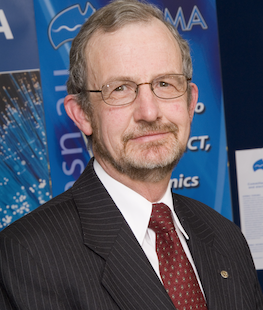
Geotourism, Ecotourism and Regional Development: challenges and opportunities
Over the past 25 years in Australia, ecotourism has grown in partnership with the development of protected areas, and much of the formal government strategic planning for the growth of nature based tourism generally has been linked to the national park system. However, within other areas where tourism is well established, ecotourism has found a well-supported niche. Geotourism, on the other hand, is an emerging global phenomenon which fosters tourism focuses on the geology and landscapes which shape the character of a region.
Preliminary work undertaken in 2017 in support of the Pre-Aspiring Etheridge UNESCO Global Geopark located in the Gulf Savannah country of Far North Queensland has identified a whole range of issues that will impact on the future of ecotourism and geotourism development outside of protected areas. A number of these issues relating to community concerns about the potential impact of tourism on existing industries such as grazing and mining as well as a widespread fear of associated environmental controls has resulted in the geopark initiative being deferred by the proponent, Etheridge Shire Council. Whilst much of this concern can be linked to recent UNESCO involvement in the Great Barrier Reef and Daintree World Heritage Areas, the opposition to tourism development generally has proved an unexpected outcome, particularly as strong support for this project has been shown by other groups particularly national park managers, indigenous communities , two major ecotourism operators, the Savannah Guides Network and township communities which are looking for new avenues for economic development.
An exploration geologist by profession, Angus established Leisure Solutions® in 1993 joining Ecotourism Australia Ltd as an early member. In recent years he has served as inaugural chair of the Geotourism Standing Committee of the Geological Society of Australia and is a member and inaugural chair of the Geotourism Forum of Ecotourism Australia, as well as a special member of the Savannah Guides.
After 20+ years working in technology and industry development executive roles, he is now engaged in ecotourism activities in Queensland’s Scenic Rim as an eco-certified tour operator and in facilitating geotourism projects throughout Australia. In earlier years he has enjoyed roles as the Director, Commercial Services at Taronga and Western Plains Zoos, as the inaugural Director of Sydney’s former redeveloped Geological and Mining Museum (The Earth Exchange), and has managed the Mt Hotham Alpine Resort in Victoria during its early developmental period.
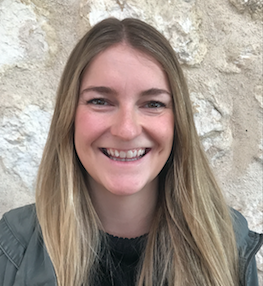
Tanya Rosewarne is co presenting with Melanie Stonnill
Tanya graduated with a degree in Biological Sciences from Deakin University, Melbourne. Later completing an Honours degree studying Tasmanian devil (Sarcophilus harrisii) behaviour at Healesville Sanctuary, Victoria. After travelling extensively throughout Asia Pacific & Europe, she began working at Seal Bay in 2013.
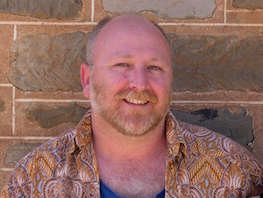
Rewilding Yorke Peninsula: Linking biodiversity conservation and ecotourism.
Although a well-established conservation management practice world-wide, “rewilding†remains a novel concept in Australia. Rewilding projects seek to restore the natural balance within systems, through the reinstatement of vital processes such as; predation, pollination, and fire. In Australia, much discussion is currently focused on the reintroduction of predators to manage feral animal and over-abundant herbivore populations (trophic rewilding), enabling the recovery of habitat and threatened species populations.
Extensive land clearance on upper Yorke Peninsula for agriculture, has left the remnant high-quality vegetation on the foot of the peninsula effectively functioning as a 250,000 ha mainland island. The quality of these vegetation associations is slowly deteriorating, due to the absence of essential ecological processes that were once provided by the 27 (of 30) terrestrial mammal species now locally extinct. Envisaged as a 20 year project, the Rewilding Yorke Peninsula project will reintroduce keystone species to reinstate the required ecological processes to ensure the long-term conservation of southern Yorke Peninsulas unique ecosystems.
The project has been developed with an emphasis on ensuring cross-sector outcomes for local tourism. In essence, southern Yorke Peninsula will be transformed into a landscape-scale, open-range sanctuary for some of Australia’s most iconic and endangered wildlife, providing the base for the development of an international ecotourism industry and enhancing local economies. Initial priorities for reintroduction include the woylie (soil engineer) & western quoll (native predator), but subsequent reintroductions may include the numbat, greater bilby & another 8 EPBC listed fauna species
Following a 10 year stint in the Queensland and New South Wales outback, researching the effects of feral animals on native species, I moved to the Clare Valley in 2002, to take on a position as Regional Ecologist for the Department for Environment & Heritage. Through various departmental transmogrifications, I have held the positions of Conservation Programs Manager, Landscape Programs Manager and have recently been appointed as the Manager Planning and Programs for Natural Resources Northern & Yorke (DEWNR). During my time in the region, I have focused on developing biodiversity conservation programs and more recently overseen the development of the regions natural resource management planning processes and the sustainable agriculture, water resource management, and Aboriginal engagement programs.
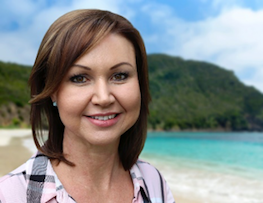
Trina Shepherd is the Executive Officer for Lord Howe Island Tourism and is responsible for leading and managing the Lord Howe Island Tourism team and operations. Her responsibilities include leveraging tourism industry relationships and enhancing the reputation of both the destination and the organisation. Trina joined Lord Howe Island Tourism in April this year after a short contract with Tourism Australia where she worked on activity in preparation for the Gold Coast 2018 Commonwealth Games. Prior to that she was the Deputy General Manager of Norfolk Island Tourism and notably instigated the successful Destination Campaign featuring Ambassador, Ray Martin which effectively increased visitation to the island in a very short space of time.
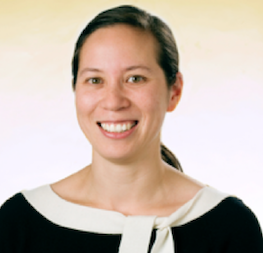
How Eco Tourism Accreditation can help you gain market share
This presentation highlights how ecotourism accreditation can provide market share, giving business a unique selling point or point of difference against competitors. Looks in depth into three South Australian tourism operators and how they use their Eco-Tourism Accreditation to stand out amongst competitors. This presentation will highlight which markets internationally are seeking such endorsements.
Claire Sim, joined the South Australian Tourism Commission in August 2016 as the Global Partnerships Manager with responsibility for the domestic and international travel trade and airline partnerships. Previously Claire was at Great Southern Rail for eleven years; nine years as General Manager Business Development and for the first two years Manager, Business Development International. Claire’s first tourism related role was in a hotel in Cairns, North Queensland where she was exposed to both leisure and business tourism. It was here that she learnt the majority of her distribution knowledge on the domestic, Eastern and Western Hemisphere markets.
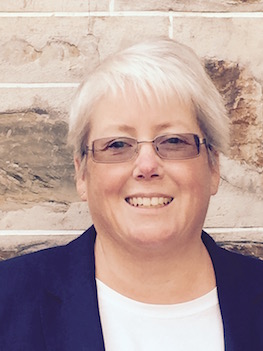
Developing industry / university partnerships to support science based ecotourism
A common theme at the Global Eco Conference in 2016 was the need for scientific content to support ecotourism ventures. To address this, the University of Adelaide has developed an undergraduate science based ecotourism degree at“ the BSc (Ecotourism)” as well an MSc in Ecotourism. Students in these degrees can specialize in either geotourism or nature based tourism and study electives in Indigenous cultures, wine science, and entrepreneurship. Developing strong links with ecotourism operators and government are essential if the programs are to be successful; our hope is that students will undertake research projects in partnership with these agencies. The aim of this talk is to discuss how we might develop our programs to best support the ecotourism industry and maximize the employability of our graduates.
Sandy Steacy is the Deputy Executive Dean of Sciences at the University of Adelaide and the lead for the new BSc (Ecotourism) and MSc (Ecotourism). She is a geophysicist who specialises in earthquake research.
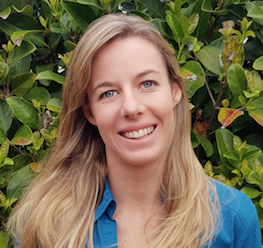
30 years of managing the delicate balance between a growing eco-tourism industry in a protected area
Seal Bay Conservation Park is located on the south coast of Kangaroo Island in South Australia and is home to the third largest colony of endangered Australian sea lions. For the last 30 years, the Department of Environment, Water and Natural Resources (DEWNR) have managed guided tours into the heart of the colony, 364 days of the year. Tourist numbers have been on a steady increase and reached their highest point last financial year at 115,000.
Managing large numbers of tourists whilst maintaining the welfare of the sea lions and protection of the environment requires close monitoring and management. Local policies and procedures have been refined over the years and we have arrived at a point where people can observe this species in their natural environment without impact.
DEWNR has established close partnerships with numerous research institutes and plays an active role in leading field research and data collation to assist scientists to strategize mitigation policies in an effort to halt the continuing decline of Australia’s only endemic pinniped.
After 30 years Seal Bay continues to manage this delicate balance of providing an unforgettable eco-tourism experience through guided tours within a wild sea lion colony by combining the delivery of conservation methods, latest research and the ability for people from all walks of life to observe this endangered species on the pristine south coast of KI.
Completing a bachelor in Tourism Business Management Mel went on to work at luxuary lodges before starting at Seal Bay in 2012. Bridging the protection of the environment and wildlife with tourists and local communities through educational awareness and providing inspirational experiences is her career passion.
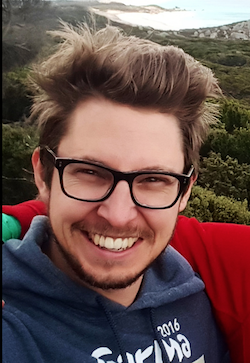
West to East: Ecotourism across global cultures - Lessons for Australian tourism operators
While floating in the thermal mineral waters of Blue Lagoon, Iceland, I dreamed of all of the tourism experiences that I’d studied within a whirlwind visit … hiking through mountains, snowmobiling on ice, walking into glacial caves and being lifted into the chamber of a sleeping volcano. Replenished with energy I floated to the Lava Restaurant, for one last meal before flying on to my next destination - Artic Char, Dark Ale and classic Nordic bread with salted butter.
I paused … every landscape and story was reflecting back at me, from a ceramic plate. I could taste the ocean, taste the earth and the mountain air. In one mouthful I experienced the whole of Iceland.
How do you distil the essence of a place in one seamless ecotourism experience?
In this presentation, Matt Sykes shares blue-sky ideas and practical lessons gathered during four weeks travel from West to East. Hear stories about Icelandic tourism’s booming success, enter the world of food tourism in urban Norway, relax in the midsummer sauna culture of Finland, and journey along an ancient pilgrimage in rural Japan.
Matt will close by outlining seven core principles for developing rural and urban tourism products:
Identity, Collaboration, Entrepreneurship, Communication, Seasonality, Journey, Humanity
Matt Sykes, a young nomadic entrepreneur
In 2014, soon after studying entrepreneurship at the University of Cambridge Matt moved to Tasmania to explore it’s ecotourism industry, retraining as an Adventure Tour Guide. In Winter 2017 he embarked on a month-long study tour of the Nordic region and Japan, seeking inspiration from their respective outdoor cultures. His presentation focuses on the lessons of this experience and how they relate to the future of Australian tourism.
Back in Australia, Matt works as the Experience Manager for Cradle Mountain Huts. He also consults for a number of industry-leading operators, including Victoria’s Peninsula Hot Springs and the emerging wukalina Walk, a multi-day Aboriginal cultural experience near the Bay of Fires, Tasmania.
Instagram: @mattsykes_tas
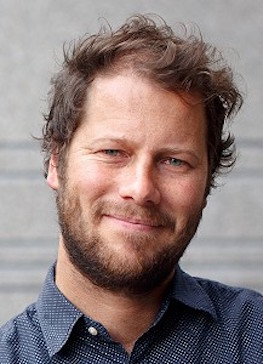
Nicholas is co-presenting with Scott Verdouw
Nick joined Jaws Architects in 2015 after having 10 years of post-graduate experience in architecture and property development.
He is also a qualified property consultant and is experienced in marketing, design, and the sales process.
Nick has exceptional communication skills and is passionate about contributing to a collaborative and a positive work environment - he is a team player and often is the “galvaniser” of the team.
Nick brings his passion for life into the workplace.
Outside of work hours he enjoys being on, in, or under the water and is currently embarking on making his own Tasmanian Pinot Noir!
Parkapiki: Connecting People to their Local Parks and Community.
In May 2017, Team Enventive won a $100,000 Digital D3 Challenge run by the Office for the Ageing to further develop a web-based platform and collaborative social marketing campaign, called ‘Parkapiki’. The aim of the D3 Challenge is to help government meet the needs of the community and support innovative new South Australian business ventures. Competitors develop intellectual property, which they can then commercialise in the marketplace. The key benefit for government is the ability to innovate faster and cheaper. In addition, to show support for new or start-up enterprises and establish connections with local digital entrepreneurs. Parkapiki will encourage online sharing of information about parks including ratings, photos and comments. The website will comprise several components: • An information portal about parks and open spaces – from national parks to local council parks. • Membership ranging from free individual membership to paid memberships and partnerships • Geo-fenced competitions – Geofencing License holders will be able to conduct ongoing competitions that requires the user to visit their chosen park and use a mobile device to activate a geo-coded entry form.
Parkapiki has been developed by Neil Mackenzie and Adrian Adams. Neil is General Manager of Enventive, an event management and marketing agency that focuses on providing and promoting opportunities for the community to be active through initiatives such as the Corporate Cup, Life Be In It and VacSwim programs. Adrian is Founder and Creative Director or JABA graphic design firm, with project experience including marketing for the 2000 Sydney Olympics, branding for Coopers and Austereo and web development for regional tourism operators in South Australia. By providing a digital platform that encourages more people to visit parks, Parkapiki will not only assist in progressing South Australia’s Healthy Parks Healthy People agenda, it will also address a range of other South Australian government priorities including Digital by Default, the Nature-based Tourism Strategy and the ‘Connecting residents of the north and south with nature’ election commitment.
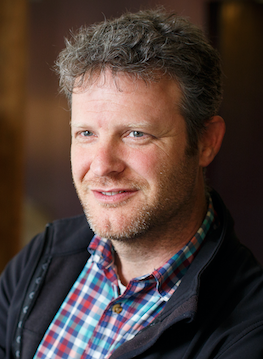
Tourist Architecture for Unique Places
Finding the uniqueness of a place is increasingly valued and inversely illusive within our built environment. Technology creating artificial microclimates and universally sourced materials have created global architectural styles that say very little about their environment or ecology. Designs that buck the trend and fight to reveal the ‘uniqueness of place’ can offer a so much more to the visitor. These special buildings enhance the understanding and experience of the place.
JAWSARCHITECTS argue that finding the ‘uniqueness of place’ is essential for successful and responsible tourism architecture and development. JAWS place considerable emphasis on understanding the natural landscapes, cultural and historical connections, geological forms, and endemic flora and fauna. Their body of tourism work, which includes award winning projects like the 3 Capes Walking Track Cabins testifies to their commitment to finding the uniqueness of place.
Unrelenting commitment to understanding the clients needs, then guiding and partnering with them towards outcomes that explore untapped possibilities in new ways are what set JAWS apart.
Scott has been with JAWSARCHITECTS since 2002 and has worked on a number award winning tourism projects in this time. These include Three Capes Cabins, Burnie Surf Club, Moorilla Estate Reception Centre, and prefabricated accommodation. Scott has a special interest in sustainable architecture in remote environments.
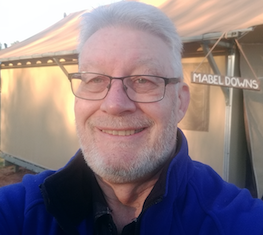
A Beehive Balancing Act for Eco-tourism in the Bungle Bungles
The spectacular Purnululu National Park World Heritage Site is one of Australia’s most iconic and remote tourism destinations, located in the Kimberley region of Western Australia. The area is home to the Bungle Bungle Range, with its distinctively banded beehive-like sandstone cone towers and deep craggy gorges formed over 20 million years, and to the Gidja and Jaru Aboriginal communities for at least 40,000 years. Yet, this area was not known to the outside world until 1983 and is a relative new-comer to the eco-tourism scene.
Attracting only 25,000 domestic and international visitors annually due to limited 4WD and air access, the World Heritage Advisory Committee and Western Australian Parks and Wildlife Service are currently examining best practice methods in which visitor numbers may be sustainably increased to the benefit of regional communities such as Kununurra and Halls Creek, while protecting the highly sensitive karst geology and semi-arid savannah grassland environment. The Gidga and Djaru people are actively involved in the park management in conjunction with the Western Australian Department of Biodiversity Conservation and Attractions (DBCA). Presentation of their culture, rock art sites and traditional knowledge of the park while protecting sacred sites is another challenge to planning for eco-tourism.
Purnululu presents a very challenging, fragile and unique environment, requiring careful eco-tourism planning to achieve the right balance of visitor, tour operator and Indigenous community access, opportunities, experiences, facilities and safe-guards. A partnership approach to creating an environmentally, culturally and economically sustainable future for this outstanding protected area is presented.
Dennis Williamson has an extensive career in scenic, recreation, tourism and natural resource management for government agencies and as a consultant in Australia and internationally. He is the Scientific Advisor on the Advisory Committee for Purnululu National Park World Heritage Area. He is also Director of Melbourne-based Scenic Spectrums Pty Ltd and its Geoscene International division. Dennis has provided expert assessments for the Ningaloo Coast, South China Karst – Three Natural Bridges and Wet Tropics of Queensland World Heritage sites. He has led consultancies on Albany’s Kinjarling Trail & Stories project, Port Fairy’s Griffiths Island Natural and Cultural Interpretive Trail; Lake Catani Campground at Mount Buffalo National Park, the Tully Gorge Whitewater Rafting Management Plan, the Kokoda Track Heritage Interpretation Strategy in PNG, and Western Australia’s Nullarbor Karst Region. He holds a BA in Geography, an MLA in Landscape Architecture, and is nearing completion of a PhD in Landscape Ecology.
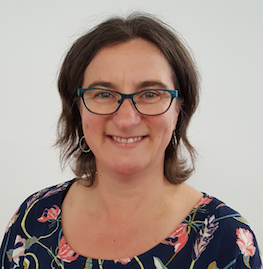
Cuttlefish Coast: a psychedelic side-show. A government and non-government partnership creating a visitor experience like nowhere else.
The Cuttlefish Coast near Whyalla in South Australia is the only place on earth where giant cuttlefish aggregate in large numbers to breed. This colourful show is spectacular. Best of all it can be viewed by snorkelling a short distance from shore and in only 2 metres of water. Over the last few years publicity about this phenomenon has grown partly because of an increase in cuttlefish numbers and great underwater photographers, but also because of the collaborative effort between the SA government (DEWNR Marine Parks) and the non-government organisation Experiencing Marine Sanctuaries (EMS). This collaboration has made the cuttlefish experience more accessible to families and tourists by providing safe and educational snorkelling. EMS tours were introduced at the Cuttlefish Coast in 2016 and proved so popular that 250 tickets sold out within days this year. This led to an economic boost for Whyalla during a normally quiet winter weekend.
EMS is a new organisation in South Australia, based on the successful program in New Zealand (Experiencing Marine Reserves) and provides families and tourists with unique, safe and supervised snorkelling opportunities with a marine education focus.
The Cuttlefish Coast Sanctuary Zone is located within the Upper Spencer Gulf Marine Park, one of 19 marine parks around South Australia declared in 2009 to help protect a range of habitats and flora and fauna.
The benefits of collaborative relationships in developing regional nature-based tourism experiences will be discussed and will also feature some dynamic footage taken by Carl Charter.
Jessica Wilson coordinates the stewardship program across South Australia’s marine parks and has worked in park visitation roles within the Department of Environment, Water and Natural Resources for over 15 years. Her passion for engaging families and tourists in nature has led to a number of programmes including the Immerse Yourself in a Marine Park summer programme.
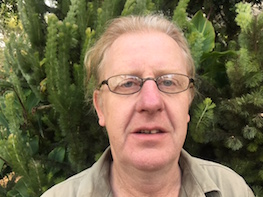
Socially responsible urban and regional tourism: an ethical approach.
Tourism consumers are increasingly becoming more aware of global environmental issues and are taking greater interest in the ethics of the businesses they patronize. Increased scrutiny and competition for services make it more important than ever to demonstrate they are giving back to society or managing their environmental footprint. In turn, these businesses enjoy more loyalty from their customers than those that do not.
This presentation will focus on Zoos SA’s seven year sustainability journey, from the development and implementation of an Environmental Plan and emissions reduction strategy to the annual public disclosure of its environmental performance and the transition to sustainability as a business-as-usual approach. We will also touch on the key benefits that have been realised along the journey such as financial savings, support gained from local government and external organisations that share mutual aspirations and industry peer credibility.
Sustainable business operations need not be onerous and the presentation will demonstrate that integrated sustainable practices can be tailored to suit ones needs or capacity and developed over a number of years.
Join us for a celebration of corporate social responsibility and learn of what steps organisations can take to move towards a more sustainable business model.
Wayne has worked at Zoos South Australia for 23 years, initially within the asset department. Zoos SA began its journey to a more sustainable operation in 2009 when a new position for a dedicated Sustainability officer was created in 2009 and Wayne accepted the role. Enthusiasm, support from management and a blank canvas gave Wayne the elements required to help develop Zoos SA’s Environmental Management Plan. Wayne is passionate about the environment, sustainable living and social justice and endeavours to apply those principles in his work relationships and home life.
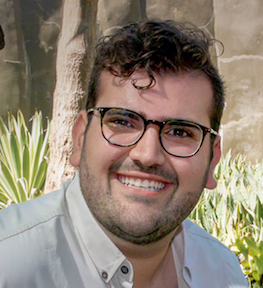
Digitising the traditional Zoo experience
In a world where digital marketing and communications is becoming the way that consumers look to learn and integrate their day to day lives, Zoos South Australia knew that it was time to review the traditional zoo experience.
Through marketing, visitors are relying on peer reviews, the color and movement of social media and online channels to prepare for their visit. When on site, visitors are looking for an interactive experience where information that is relevant to them and the environment around them is presented. Over the past 12 months, through a range of digital marketing and communication activities, Adelaide Zoo became the first Zoo in Australia to introduce iBeacon technology which has digitized what would normally be a traditional visit to the Zoo. This has been delivered through location specific Bluetooth beacons which delivers information to users devices. A general visitor trail, threatened species trail, zoo careers trail and a Chinese trail are options available for selection on arrival to the zoo.
Through this technology, Zoos SA is essentially putting a keeper in the palm of every visitors hand to learn about the animals that call Adelaide Zoo home, the conservation threats for the species and most importantly educating visitors to understand how they can make a contribution to conservation. Whether that be through smart shopping, becoming a member of the Zoos SA or giving back to environmental conservation - we are confident that this platform has assisted to provide streamlined messaging.
Digital Marketing has assisted to drive record attendance for Adelaide and Monarto Zoo with almost 600,000 visitors in 16/17. There is little wonder the accelerated growth of social media for both sites, email marketing and retargeting has led to an ecommerce conversion increase of 160% year on year.
Hayden Zammit manages Tourism for Adelaide and Monarto Zoo, and previously led the digital strategy across both sites. Hayden’s experience in digital marketing, trade and visitor experience has assisted to develop a holistic customer journey online.
Hayden brings a Bachelor of Management (Marketing) and an International MBA (Tourism and Events) to the organisation.
Previously, Hayden managed the destination marketing campaign for Broken Hill City Council and worked closely with Eco Tourism operators across the Far West of New South Wales to promote the real, unique experiences that highlight the wide, open spaces of Outback NSW.
In 2017 Adelaide Zoo and Monarto Zoo became Eco Tourism Advanced certified attractions which highlights their contribution to conservation, animal management and sustainability.